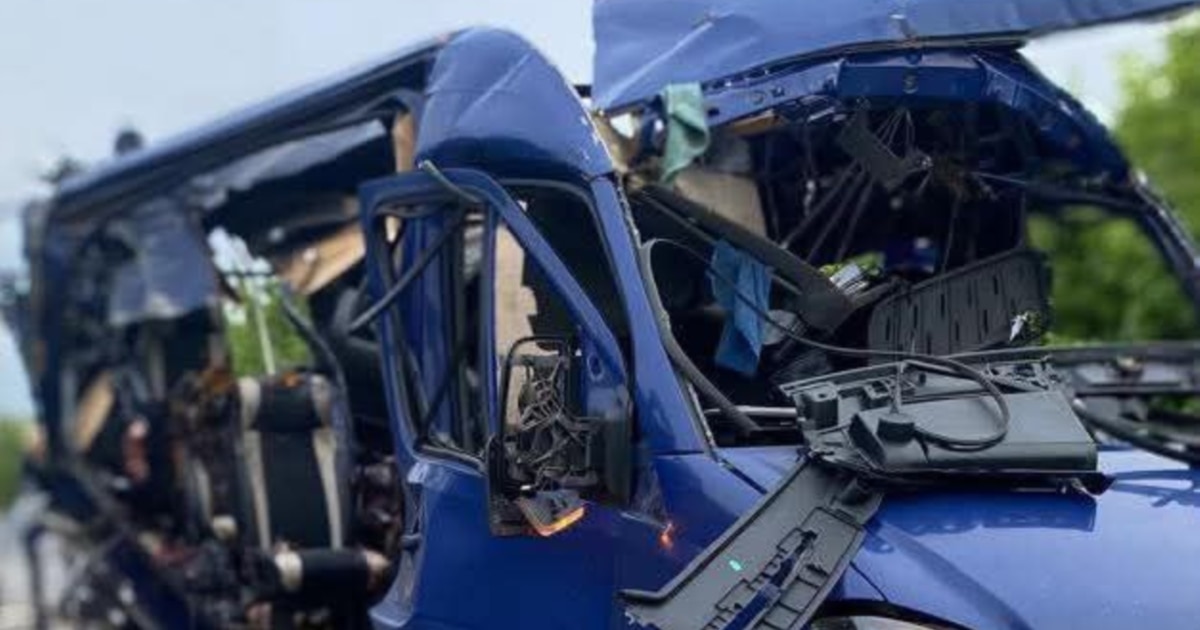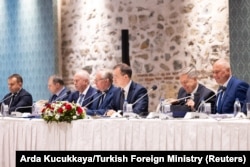A Russian drone strike hit a minibus carrying civilians in the Sumy region near the Russian border, killing nine people and wounding four others, Ukrainian authorities said.
The attack on May 17 came a day after the first direct peace talks in more than three years ended without a breakthrough and with Kyiv accusing Moscow of making “unacceptable” demands.
Russia has rejected calls by Ukraine, European countries, and the United States for a 30-day cease-fire in the war, now well into its fourth year since Russia’s full-scale invasion of Ukraine in February 2022.
The attack was carried out with a drone, the Sumy regional military administration said.
Ukraine’s National Police charged that Russian forces deliberately targeted the minivan, which was being used as an intercity bus. It was hit near the town of Bilopillya, not far from the Russian border.
Images posted by the National Police on Telegram showed a mangled Mercedes minibus and debris scattered on the roadside.
There was no immediate comment from Russia, which claims it does not target civilians despite ample evidence to the contrary. The Sumy region is the site of frequent Russian attacks.
After the sort and inconclusive talks between Ukrainian and Russian delegations in Istanbul on May 16, US President Donald Trump said a meeting with Russian President Vladimir Putin is needed to make progress in ending Europe’s longest conflict since World War II.
“We have to get together,” Trump told Fox News in an interview. He said he was optimistic about engaging with Putin but is ready to apply pressure on Russia if necessary.
“I think we’ll make a deal with Putin…. [I] will use leverage on Putin if I have to,” he said.
Kremlin spokesman Dmitry Peskov said on May 16 that a Trump-Putin meeting to discuss bilateral ties, Ukraine, and other matters is “certainly necessary” but would take time to prepare and should not be held unless it produces results.
Talks Fail To Bridge Divide
At the Istanbul talks, which lasted about 90 minutes, negotiators agreed to exchange 1,000 prisoners on each side in the near future, the heads of both delegations said. That would be the largest single swap since the start of the full-scale invasion.
But there was no indication that the wide gaps between Russia and Ukraine on issues such as territory and a cease-fire were narrowed. European leaders joined Ukrainian President Volodymyr Zelenskyy in condemning Moscow.
“The Russian position is clearly unacceptable, and not for the first time,” British Prime Minister Keir Starmer said in a joint statement with the leaders of Poland, Germany, and France at a summit in Tirana, Albania.
He said that after a meeting with Zelenskyy, who was also at the summit, and a joint phone call with Trump in which they discussed the Istanbul talks, “we are now closely aligning and coordinating our responses and will continue to do so.”
“Ukraine is ready to take the fastest possible steps to bring real peace, and it is important that the world holds a strong stance,” Zelenskyy said on social media after the call with Trump.
“Our position [is that] if the Russians reject a full and unconditional cease-fire and an end to killings, tough sanctions must follow,” he said. “Pressure on Russia must be maintained until Russia is ready to end the war.”
Reuters cited an unnamed Ukrainian source as saying the Russian delegation made demands that were “nonstarters” and were “detached from reality and go far beyond anything that was previously discussed.”
AFP quoted a Ukrainian source as saying one such demand was “for Ukraine to withdraw forces from large parts of Ukrainian territory it controls in order for a cease-fire to begin.”
That was a reference to four regions that Russia partially occupies and baselessly claims are Russian — Donetsk, Luhansk, Zaporizhzhya, and Kherson. Ukraine holds parts of those regions, including the capitals of Zaporizhzhya and Kherson.
Meanwhile, Russian delegation head Vladimir Medinsky, an aide to Putin, said Moscow was “satisfied with the result” on the whole and is “ready to continue contacts.” He said his delegation had “taken note” of what he said was a Ukrainian request for talks between Zelenskyy and Putin.
Medinsky also said the negotiators agreed that “each side will present its vision of a possible future cease-fire and spell it out in detail. After such a vision has been presented, we believe it would be appropriate, as also agreed, to continue our negotiations.”
Expectations for a breakthrough had been low at the first direct peace talks since unsuccessful negotiations held in the first two months of the 2022 invasion.
The talks capped a frenzied week of diplomacy fueled by Trump’s push to broker an end to the war, which has killed tens of thousands of soldiers on both sides and a growing number of Ukrainian civilians.
Moscow has rejected calls for a full and extendable 30-day cease-fire, saying a truce can only come as the result of negotiations, and Putin spurned Zelenskyy’s invitation to hold their first face-to-face meeting since 2019.
“This week we had a real chance to take important steps toward ending this war. If only Putin had not been afraid to come to Turkey,” Zelenskyy said in Tirana.
Russia’s Goals Remain Unchanged
Putin launched the full-scale invasion eight years after Russia seized Ukraine’s Crimean Peninsula and fomented war in the eastern Donbas region in 2014. Russia now holds about one-fifth of Ukraine’s territory but has fallen far short of Putin’s goal of subjugating the country, independent since the Soviet collapse in 1991.
The only previous direct peace talks broke up in the spring of 2022 as the sides wrangled over major points of contention and amid revelations of atrocities committed by Russian forces in Bucha, a city they abandoned as they withdrew from northern Ukraine after failing to capture Kyiv.
In those negotiations, Russia was seeking a deal that analysts said would have amounted to Kyiv’s surrender, leaving Ukraine a permanently neutral country with a small and toothless military, limited sovereignty, and little or no access to Western security support.
Russian officials have suggested Moscow has not scaled back its goals despite its failure to seize Kyiv and its slow progress on the battlefield, where small territorial gains have come at a high price in Russian casualties.
Some experts say that a cease-fire at the current line of hostilities would be a blow to Putin’s reputation at home but that the Kremlin could be forced to accept it nonetheless if the West ratchets up economic pressure on Russia, including significantly widening sanctions on its oil shipping fleet.
Russia ‘Not Serious’ About Peace, Says Zelenskyy
The Kremlin has referred to the May 16 talks as the “resumption” of the 2022 negotiations. Medinsky also led the Russian team at those talks. Zelenskyy described the Russian delegation as “decorative” and said its makeup showed “they are not serious enough about the negotiations.”
“The Russians want to draw associations with the year 2022,” Zelenskyy’s chief of staff, Andriy Yermak, said on May 16. “But the only thing that connects to those negotiations is the city of Istanbul. And nothing more. All attempts by the Russians to tie today to 2022 will not work.”
With Russia rejecting the cease-fire calls, the European Union is preparing a new package of sanctions against Moscow, including measures focusing on Russia’s financial sector and its lucrative energy exports.
“We will increase the pressure,” European Commission President Ursula von der Leyen said in Tirana.
Putin has repeatedly said any peace deal must address what Russia calls the “root causes” of the war, a term that evokes the demands Russia made before it launched the full-scale invasion: that Ukraine become a neutral state, dramatically curtail its military, and abandoning its aspirations of joining NATO, among other things.
In addition, Moscow has said Kyiv and the West must accept Russian sovereignty over Donetsk, Luhansk, Zaporizhzhya, and Kherson, the four partially Russian-occupied mainland Ukrainian regions that Putin baselessly declared in September 2022 were part of Russia.
“Putin is not going to end this war, at least not on any reasonable terms. But what he is interested in is building some new relations with the US administration,” Kirill Martynov, editor in chief of the Latvia-based Russian language media outlet Novaya Gazeta Europe, told Current Time on May 16.
If negotiations collapse and Europe “fails to achieve some kind of joint action against Putin…then Ukraine will be the main loser — because, once again, Putin will essentially be able to continue the war,” Martynov said. He said Putin’s goal is “to keep the war going while avoiding a complete falling out with Trump.”

